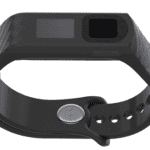B-Secur has partnered with Maxim Integrated Products to create a low-power electrocardiogram (ECG) sensor hub that can be used to enable heart rate detection in a range of wearable products. The solution pairs Maxim’s MAX30003 ECG sensor and the MAX32660 microcontroller with B-Secur’s HeartKey biometric algorithms.

The news comes mere months after the HeartKey received 510(K) certification from the US Food and Drug Administration (FDA). That certification covers B-Secur’s algorithms for Signal Conditioning, Heart Rate, and Arrhythmia Analysis, and gives the company permission to deploy those algorithms in medical products like the MAX32663A ECG sensor hub.
B-Secur suggested that the MAX32663A hub is well-suited to wearables like rings, smartwatches and chest straps, all of which can support heart rate detection. The company is hoping that the partnership will accelerate its time to market, since customers will be able to purchase the hub as a complete solution without needing to worry about algorithm licensing fees.
“We designed the MAX32660 family of microcontrollers as a secure algorithm hub to incorporate intelligent features in low power, small devices,” said Maxim Microcontroller Business Unit Executive Director Kris Ardis.
“Building IP protection into our commercial framework is a natural part of our business model,” added B-Secur CCO Ben Carter. “Particularly in wearables, the end devices must be something a consumer will wear regularly, so board real estate is at a premium. Combining the advanced HeartKey algorithm features within the small form factor of the MAX32663A is something we know our end customers value.”
The MAX32660 is an Arm Cortex-M4 microcontroller. The complete MAX32663A sensor hub, meanwhile, will be available for $7.68, while the evaluation board will go for an even $200.00.
B-Secur developed its HeartKey algorithms with the help of £4 million in venture funding that the company received in 2019. The algorithms can also be used to enable biometric authentication in a number of different settings.
–
March 29, 2021 – by Eric Weiss






Follow Us